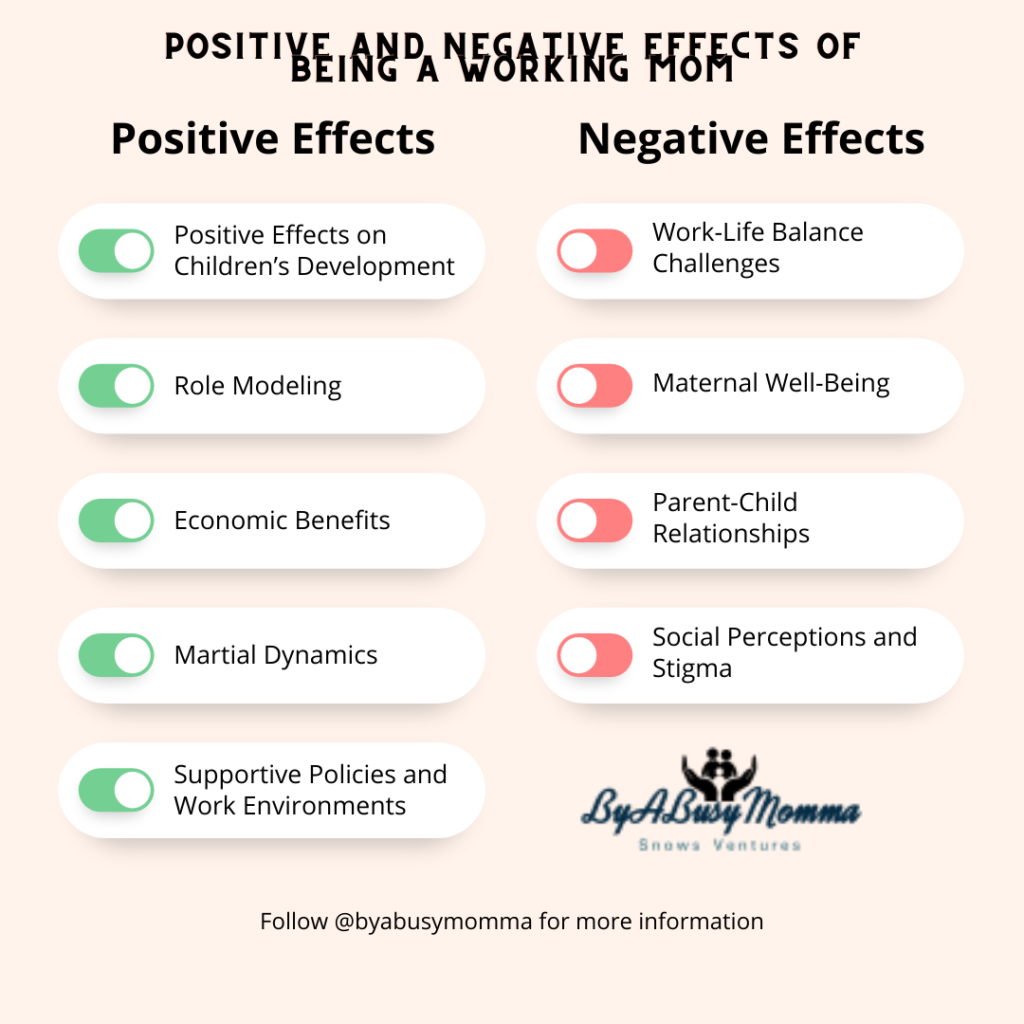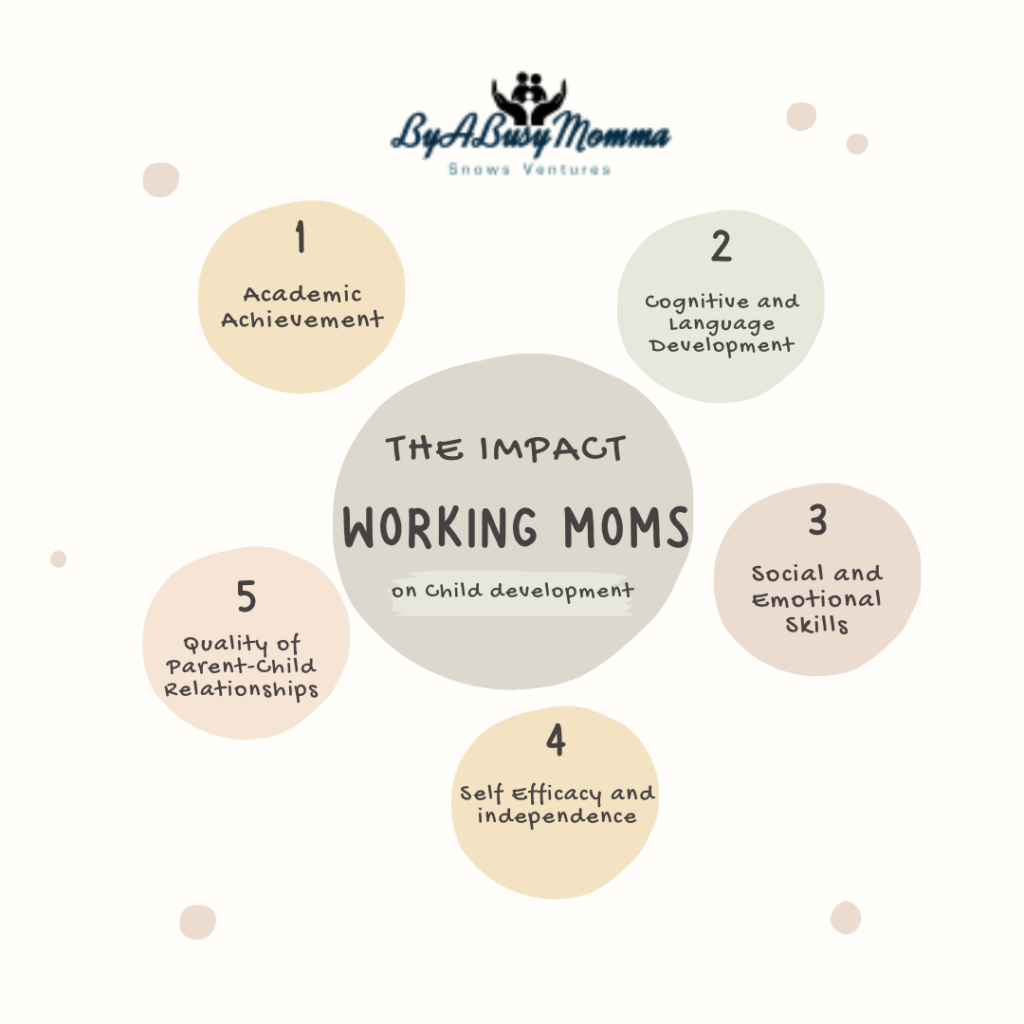As a working mom myself, I have often wondered what studies say about the effect of working moms on the family dynamic. As women, we have much guilt when it comes to work; it’s either worry that we are not present enough for the family and our children or worry that we can’t provide. If you are a single mom, that worry is even heavier. So, knowing how working affects our children is a good thing to consider. In the following article. I will review some of the positive and negative effects on the family when a mother works. As mentioned, the impact of a working mom on her family is a complex topic, and different studies have explored various aspects of this issue.
Check out some great resources on Amazon for Working Moms:

Here are some key findings and insights from the research that focus on the positive effects on the family when a mother is working:
Positive Effects on Children’s Development: Several studies suggest that working mothers’ children may experience certain cognitive and socio-emotional development benefits. For example, a study published in the Journal of Family Psychology found that children of working mothers tend to have higher academic achievement and exhibit more positive social skills compared to children of stay-at-home mothers. Working mothers may be role models for their children, displaying attributes like independence, ambition, and a strong work ethic.

Role Modeling: A mother working outside the home can promote more balance within the family. Research indicates that daughters of working mothers often have higher career aspirations and are more likely to enter the workforce themselves. Sons of working mothers are more likely to participate in household chores and caregiving activities.

Economic Benefits: A working mother’s income can provide financial stability and improve the family’s well-being. Dual-income households often have greater access to resources, which can positively impact children’s educational opportunities, healthcare, and overall quality of life.

Marital Dynamics: A mother’s employment status can influence the division of household and parenting responsibilities between partners. Research indicates that when both partners work, there is often a more equal distribution of household tasks and childcare responsibilities. This can foster a sense of shared responsibility and contribute to more equitable and satisfying marriages. Open communication, negotiation, and flexibility are essential in establishing a balance for both partners.

Supportive Policies and Work Environments: The availability of supportive policies and work environments can significantly affect the impact of a working mom on her family. Access to flexible work arrangements, paid parental leave, affordable and high-quality childcare, and supportive supervisors and colleagues can help working mothers manage their work and family responsibilities effectively. Employers and policymakers play a crucial role in creating environments that facilitate work-life balance and support the well-being of working mothers.
Here are some key findings and insights from the research that focus on the adverse effects on the family when a mother is working:
Work-Life Balance Challenges: Balancing work and family responsibilities can present challenges for working mothers. Research suggests that work-family conflict can impact maternal well-being and family dynamics. It is crucial for working mothers to have access to supportive policies and resources such as flexible work arrangements, affordable childcare, and social support networks to help manage these challenges effectively.
Maternal Well-being: Studies have found that maternal employment can positively and negatively affect a mother’s well-being. Some research indicates that working mothers may experience increased fulfillment, self-esteem, and overall life satisfaction. However, juggling multiple roles and responsibilities can also contribute to stress, fatigue, and guilt. It’s essential for working mothers to prioritize self-care and seek support to maintain their overall well-being.
Parent-Child Relationships: Research suggests that the quality of the parent-child relationship is a crucial factor in children’s development. While some studies have found no significant differences in the parent-child relationship between working and non-working mothers, others indicate that working mothers may experience challenges regarding time constraints and balancing work and family responsibilities. It’s essential for working mothers to prioritize quality time with their children, engage in activities that promote bonding and open communication, and establish a strong support network to help navigate the demands of both work and family.
Social Perceptions and Stigma: Working mothers may face societal judgments and perceptions that can impact their well-being and family dynamics. Some studies have found that working mothers may experience guilt, pressure, or criticism from others due to expectations surrounding motherhood and the stay-at-home mother role.

The positive and negative effects of working moms are by no means the final say in how you should handle your family dynamic. These are great guidelines on what you should consider as a family. It is important to note that the impact of a working mother can vary depending on factors such as the family’s cultural background, socioeconomic status, support systems, and individual circumstances. It is also essential to recognize that the experiences and outcomes of working mothers and their families can vary widely based on circumstances, cultural factors, and personal choices. Every family is unique, and the key is to prioritize open communication, mutual support, and finding a balance that aligns with the family’s values and goals.

Another critical factor to consider is the impact of a working mom on children’s development. Experts have extensively studied this topic and here are some key findings from the research:
Academic Achievement: Research suggests that children of working mothers tend to have higher academic achievement. A study published in the Journal of Family Psychology found that children of working mothers had higher math scores and were more likely to complete college compared to children of stay-at-home mothers. Exposure to a working role model may instill a sense of motivation, ambition, and discipline in children.
Cognitive and Language Development: Working mothers’ employment has been associated with positive mental and language development outcomes for children. A study published in Child Development found that children of working mothers had better cognitive and language skills compared to children of stay-at-home mothers. The exposure to a stimulating environment, interactions with other adults, and access to quality childcare can contribute to these positive outcomes.
Social and Emotional Skills: Research suggests that children of working mothers often exhibit more positive social skills and emotional well-being. They may have better social competence, independence, and problem-solving abilities. The exposure to different social environments, interactions with peers and caregivers, and the development of emotional resilience can contribute to these outcomes.
Self-Efficacy and Independence: Children of working mothers often develop a sense of self-efficacy and independence. They may feel more confident in navigating challenges and taking on responsibilities. The exposure to a working mother as a role model can contribute to children’s belief in their capabilities.
Quality of Parent-Child Relationships: The impact of a working mom on the parent-child relationship can vary depending on various factors, such as the quality of childcare, the amount of time spent together, and the overall work-life balance. Research suggests that the quality of the parent-child relationship is more influenced by the quality of interactions and the emotional availability of the parent rather than the parent’s employment status. It is essential for working mothers to prioritize quality time and maintain open communication with their children to foster a strong parent-child bond.

It’s important to note that the effects mentioned above are general trends observed in research and may not apply universally to every child or family. As mentioned, even though research may suggest many benefits, your family dynamic and parent-child relationship are most important. It’s vital to understand that emotional availability and quality interaction with your child is the key to a healthy relationship throughout their life, regardless of their working status. Also, specific circumstances, parenting practices, and other factors within a family can significantly influence children’s development. Ultimately, the impact of a working mom on her family’s children is a complex interplay of various factors, and multiple aspects of family life influence the well-being and development of children.
